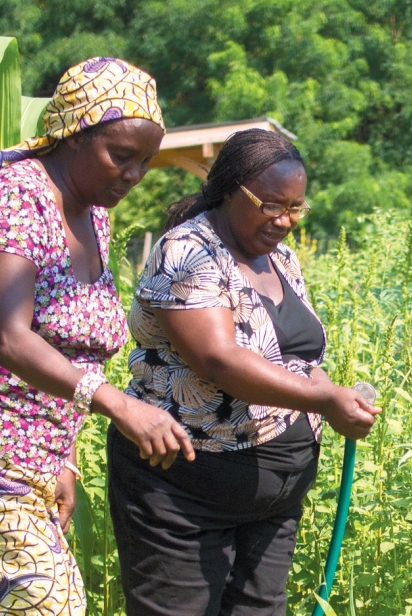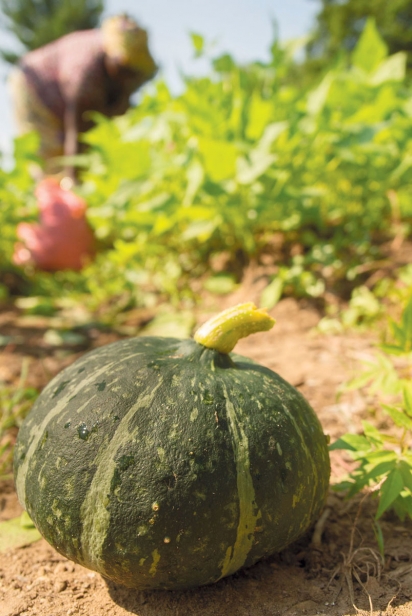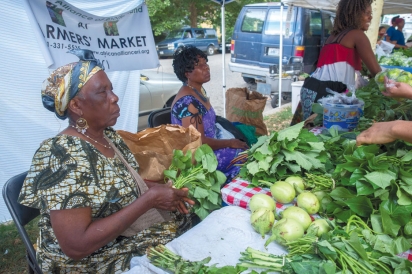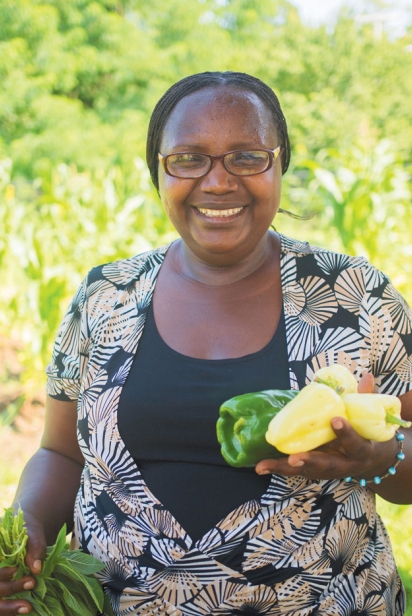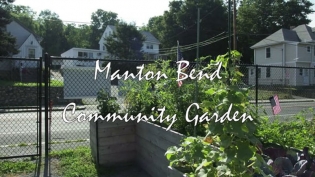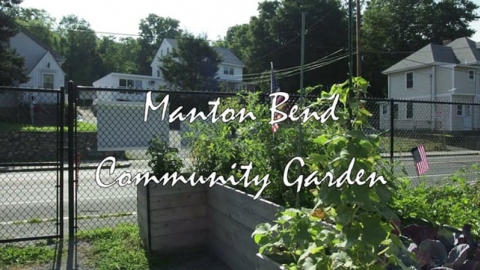Lots of Hope: An Urban Farm Collaboration Takes Root in Providence
To see Manton Bend Community Farm now—a verdant hub of raised beds and mounded plots—you would be hard-pressed to remember the way it looked just over a year ago: an unused, untamed patch of land.
Seeing the transformation from vacant lot to overflowing garden, and witnessing the economic benefit that the garden has afforded its growers, it is no wonder that the City of Providence’s Lots of Hope initiative is generating excitement. In a city teeming with urban farmers and gardening enthusiasts, a vacant lot is more than just an eyesore—it’s a wasted opportunity.
The City of Providence has teamed up with Southside Community Land Trust (SCLT) to turn vacant lots throughout the city into productive urban farms through their new initiative, Lots of Hope. Seeded by $100,000 matching funding in 2013 from the Rhode Island Foundation and Partners for Places (formerly known as Local Sustainability Matching Fund), Lots of Hope will enable local residents to access underutilized public land from the city, along with hands-on support and guidance from SCLT. This growing season has seen the first fully realized project, the Manton Bend Community Farm.
The idea for Lots of Hope came about when a young urban farmer who was having land tenure issues was able to locate a vacant property, with the help of the city, to farm in the West Side of Providence. It became clear that vacant lots could serve a higher purpose, and thus Lots of Hope was born.
“The project is inspiring in that it sees various organizations, as well as the city government, working together towards a common goal,” says Margaret DeVos, executive director of SCLT, one of the key partners involved with the initiative.
The land was identified by leadership within Providence Mayor Angel Taveras’s administration (including the Office of Sustainability, Healthy Communities Office, and Policy Department). Manton Bend was chosen for its location, size (five city-owned parcels that could be transformed into 12,000 square feet of growing space) and potential for revitalization. Once the space was identified, the City worked with SCLT and Kate Lacouture, a landscape architect with Green Circle Design, to design the garden.
The project came together quickly: In January 2013 the funding was received and in April a $1/year lease for five years was passed unanimously by Providence City Council for SCLT to rent the land from the city. That summer, Casa Buena Builders began the building process, with care given to install gravel paths, a washing station and waist-high raised beds that would be accessible by wheelchair.
By the spring of 2014, the first seedlings were in the ground.
With 14 raised beds available to community gardeners, and 50 mounded beds, which are being farmed by chosen market growers through the African Alliance of Rhode Island, a nonprofit dedicated to improving the lives of African refugees in Rhode Island, the Manton Bend Community Farm is an exciting realization of what the Lots of Hope initiative can accomplish.
In talking with Julius Kolawole, executive director of the African Alliance of Rhode Island, it is clear that Manton Bend provides so much more than just a place to garden.
“The garden is a destination. It allows the growers, all of whom happen to be women, a chance to get out of the house, share stories and build community. It also helps to relieve financial burdens, providing an extra source of income for their family.”
The produce cultivated by the market growers—generally staples from the farmers’ countries of origin meeting a previously unfulfilled demand for culturally appropriate foods—is sold at local farmers’ markets, including the Armory Farmers’ Market.
“These women have been selling at market since 2012, and they have been very successful,” Julius says. “But as their success grew, they ran out of space in which to garden. Manton Bend provides each woman with six mounded beds, and increases their productivity tenfold.”
For now, Julius is intricately involved in the business end, assisting the women as they learn everything from math skills to customer service.
“Every time a customer asks, ‘How do I cook this?’ the growers have a chance to educate them on a new, previously unfamiliar vegetable, and possibly make a returning customer out of them,” Julius says.
Matia Mukabahizi, a grower with the African Alliance at Manton Bend, enjoys working in the garden but says, with a generous smile, that it’s hard work. She maintains several mounded beds full of squash, peas and other produce she sells at the Armory Park market. Growers with the African Alliance prefer mounded beds over the raised beds constructed for other community garden growers.
Equally important as the market-growing component is the community gardening aspect. It is the City’s hope that through the integration of market growers and community gardeners, sharing space and experience, Manton Bend will turn into a neighborhood gathering space, while also improving access to locally grown produce.
With Manton Bend successfully up and running, Lots of Hope turns its attention to the next project. There is much to take into consideration when looking for future projects: needed land improvements, soil quality, prior and current use, neighboring community assets and characteristics that make it suitable for growing, including size, shape, slope and sun exposure.
Ellen Cynar, program manager for the Healthy Communities Office, works closely with the Office of Sustainability; both have a hand in the Lots of Hope initiative. She is enthusiastic about the next project, which is shaping up to be a greenhouse, built on a vacant lot, to be used for growing produce for school lunches throughout the city’s public schools.
“At the same time,” Ellen says, “vacant lots are being vetted for the next urban farm project but there are so many components that we are looking for—a lot that doesn’t need structural improvements, a neighborhood that could benefit from a community garden, land that can be leased long-term—that it is a detailed process.”
While the details for the next large-scale project are still in the works, there is another arm of the initiative that is quietly making a difference in communities across the city. Providence COMPOSTS! supports citywide community gardens by producing nutrient-rich soil from food waste that would otherwise go into Rhode Island’s landfill. By providing buckets to residents, Providence COMPOSTS! has already begun to reduce the amount of food scraps thrown away. Currently, there are three participating neighborhoods—Smith Hill, Federal Hill/ West End and Elmwood—each with a community collection site.
It is clear that the City of Providence, working closely with partner organizations, is devoted to making a greener, more sustainably minded city for all of its residents, one bucket of compost, one vacant lot, one community at a time.
Watch the Edible Rhody Minute video segment on Lots of Hope.



